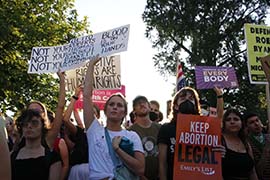- Slug: BC-CNS-Abortion Appeal,740.
- File photo, video story available (thumbnail, caption below)
By Haley Smilow
Cronkite News
WASHINGTON – Arizona Court of Appeals judges quizzed attorneys Wednesday as they tried to figure out how, or if, they can square competing abortion laws that could restrict or outright criminalize abortions in the state.
The hourlong hearing is the latest fallout from the U.S. Supreme Court’s decision this summer to reverse its Roe v. Wade decision that recognized a right to an abortion in 1973. That led Arizona Attorney General Mark Brnovich to ask a Pima County judge to lift the 50-year-old injunction that had blocked a territorial-era abortion ban under Roe.
The judge agreed in September, reinstating the 1901 law that makes it a crime to perform or aid in an abortion. But that ruling came just one day before a new state law took effect that allowed abortions up to 15 weeks of pregnancy.
The conflicting laws briefly led providers in the state to halt abortions, but the service slowly returned after the Court of Appeals blocked the lower court’s ruling. Clinics in the state are offering abortions while the appeals court tries to untangle the law.
They did not appear any closer to untangling things after Wednesday’s hearing, in which the attorney general’s office argued that the two laws could coexist and attorneys for Planned Parenthood Arizona said it was the courts’ job to “harmonize” a century of state abortion law.
“Instead of focusing on harmonization, why don’t you simply just focus on the language that is pretty important to us and adopt a construction that reconciles one with another?” Judge Peter Swann asked at one point. “Why do we even go with harmonization?”
Planned Parenthood attorney Sarah Mac Dougall argued that the Arizona Supreme Court has told lower courts “that you need to fit all of these laws together” when reconciling contradictory state laws.
Harmony has been Planned Parenthood’s prime argument throughout the legal battle over the conflicting laws. Brittany Fonteno, president and CEO of Planned Parenthood Arizona, said her organization has been asking for harmony from the courts “since AG Brnovich first filed his request to lift the injunction on the near-total ban.”
“We have been asking the court to clarify that the Civil War-era ban must be harmonized with the nearly five decades of law governing abortion that are on the books in Arizona” in the wake of Roe, Fonteno said in a statement Wednesday.
The judges appeared no less convinced by arguments from Michael Catlett, the Arizona deputy solicitor general who was representing the state. He said the two laws are not conflicting, but can coexist.
The judges seemed to disagree and asked Catlett how that could be possible. Swann gave a hypothetical asking, if a doctor were to deliver an abortion on a person who is 10 weeks pregnant, what would happen under the two laws now on the books?
“At 10 weeks, the 15-week law would not apply,” Catlett said. He then went on the explain that the 15-week ban is necessary for physicians who would attempt to deliver an abortion at 18 weeks of pregnancy.
The judges expressed concerns that the decision on whom to prosecute when, and under what law, would be left up to local prosecutors and would make it impossible for health care providers to know what they could or could not do.
After more than an hour of the judges’ spirited questioning of both sides, Judge Peter Eckerstrom ended the hearing by thanking the parties as the three-judge panel sets out to “resolve this very difficult question of statutory interpretation.”
Both sides claimed to be satisfied with the hearing afterward.
“We are hopeful that the Arizona Court of Appeals will not reinstate the superior court’s order” that revived the abortion ban, Fonteno said in her statement.
But a spokesperson for the attorney general’s office said the state is looking forward to the court providing “clarity” on the issue.
“A new abortion law passed by the Legislature and signed by the governor earlier this year indicated that our previous law was not repealed,” said the spokesperson, Brittni Thomason, in an email. “Arizonans deserve clarity and certainty on this important issue.”
Eckerstrom did not indicate when a ruling might be handed down, but the court’s decision is not likely to be the end of the legal fight over the laws.
“We know the work is far from done and we have said it all along – we will not stop fighting,” Fonteno said in her statement.
For more stories from Cronkite News, visit cronkitenews.azpbs.org.
^__=
Web links:
_ 1901 ban: https://www.azleg.gov/viewdocument/?docName=https://www.azleg.gov/ars/13/03603.htm
_ 15-week law: https://www.azleg.gov/legtext/55leg/2R/laws/0105.pdf
_ Roe v. Wade: https://supreme.justia.com/cases/federal/us/410/113/
_ Dobbs: https://www.supremecourt.gov/opinions/21pdf/19-1392_6j37.pdf
_ Pima court ruling: https://mcusercontent.com/cc1fad182b6d6f8b1e352e206/files/03e59df6-b7c5-86e0-6155-7e2aa17af07f/image09_23_2022_233015.pdf
_ Hearing video: https://youtu.be/YoGiF49Mho4
^__=
Abortion-rights advocates flocked to protest at the Supreme Court after it overturned its 1973 Roe v. Wade decision that recognized a right to an abortion. That left states like Arizona struggling to figure out what the law on abortion is in the state. (File photo by Daisy Gonzalez-Perez/Cronkite News)
